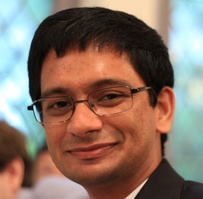
10:00 am to 11:30 am
GHC 6115
Abstract:
We seek the ultimate goal of having self-sufficient autonomous service mobile robots working in human environments, performing tasks accurately and robustly. Successfully deploying such robots requires simultaneously addressing challenges in a number of subproblems spanning the complete perception-cognition-actuation stack. In this talk, I shall present our recent research along two broad themes: algorithms for perception, navigation, and control to enable computationally efficient autonomy; and algorithms to ensure that they remain autonomous over extended periods of time, despite changes in the environment. In particular, I shall present several algorithms for time-optimal control, joint perception and planning, localization in changing environments, and non-expert guided failure recovery. These algorithms have enabled robust autonomy for our robots in real human environments, with limited computational resources, and while overcoming inevitable unexpected failures in the real world.
Bio:
Joydeep Biswas is an Assistant Professor in the College of Information and
Computer Sciences at the University of Massachusetts Amherst. He earned his
Ph.D. in Robotics from Carnegie Mellon University in 2014, and prior to that
a B.Tech. in Engineering Physics from the Indian Institute of Technology,
Bombay in 2008. Professor Biswas’ research on autonomous service mobile robots
and robot soccer has been covered by several media and news articles.
